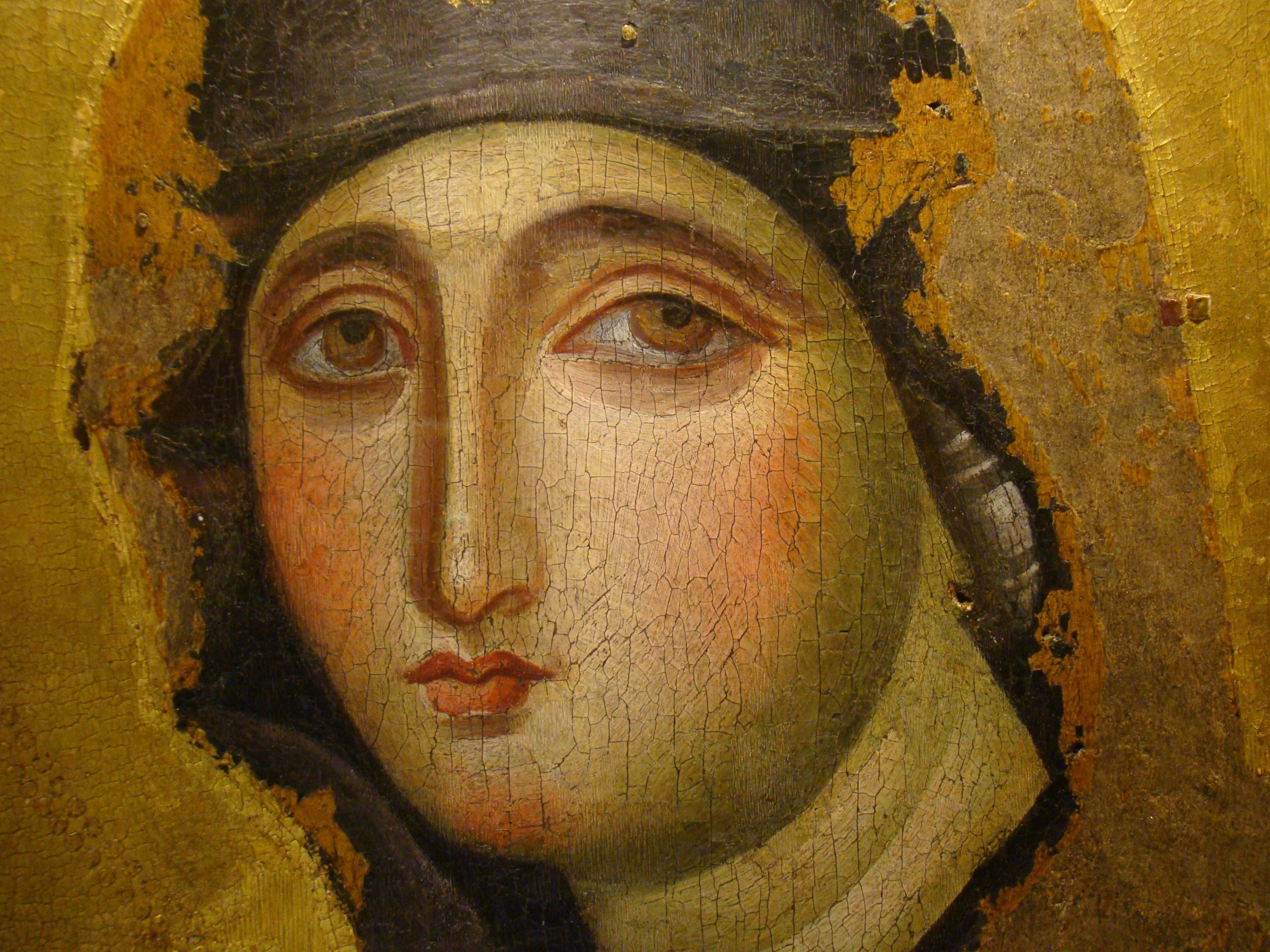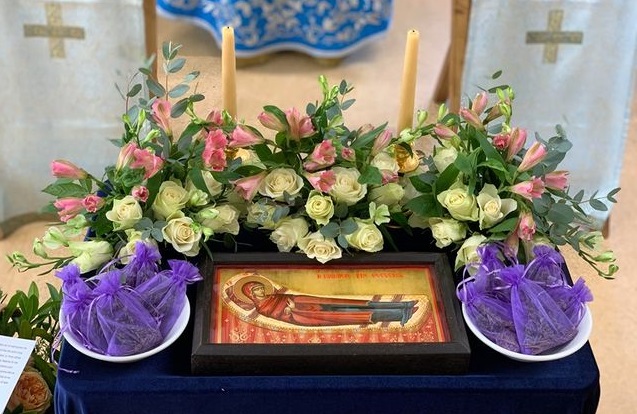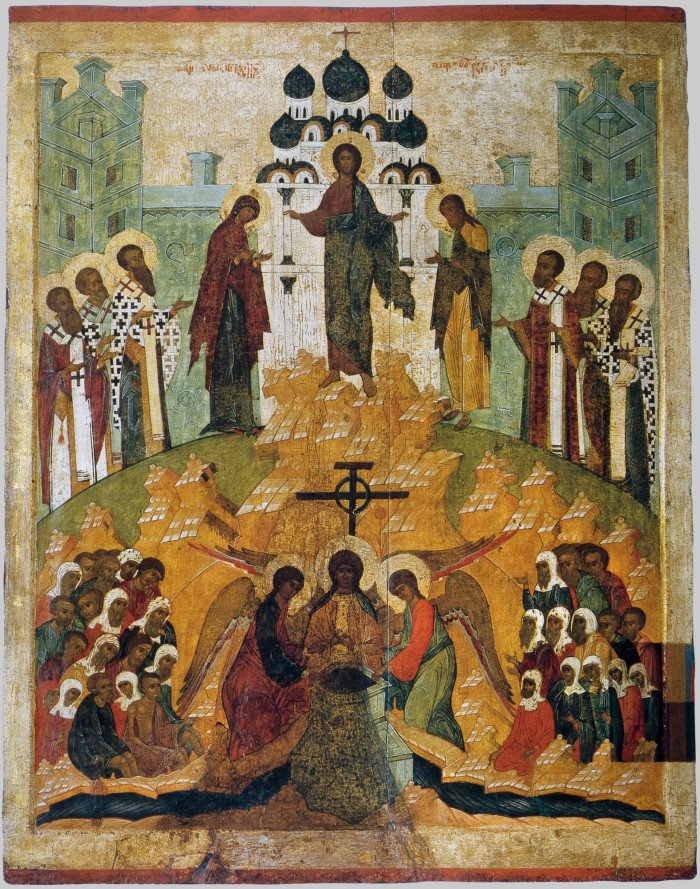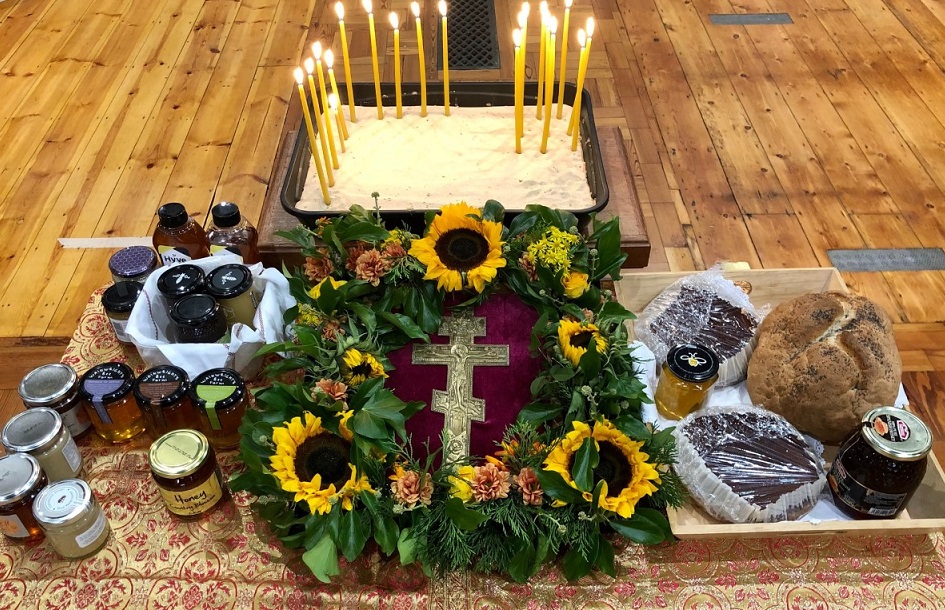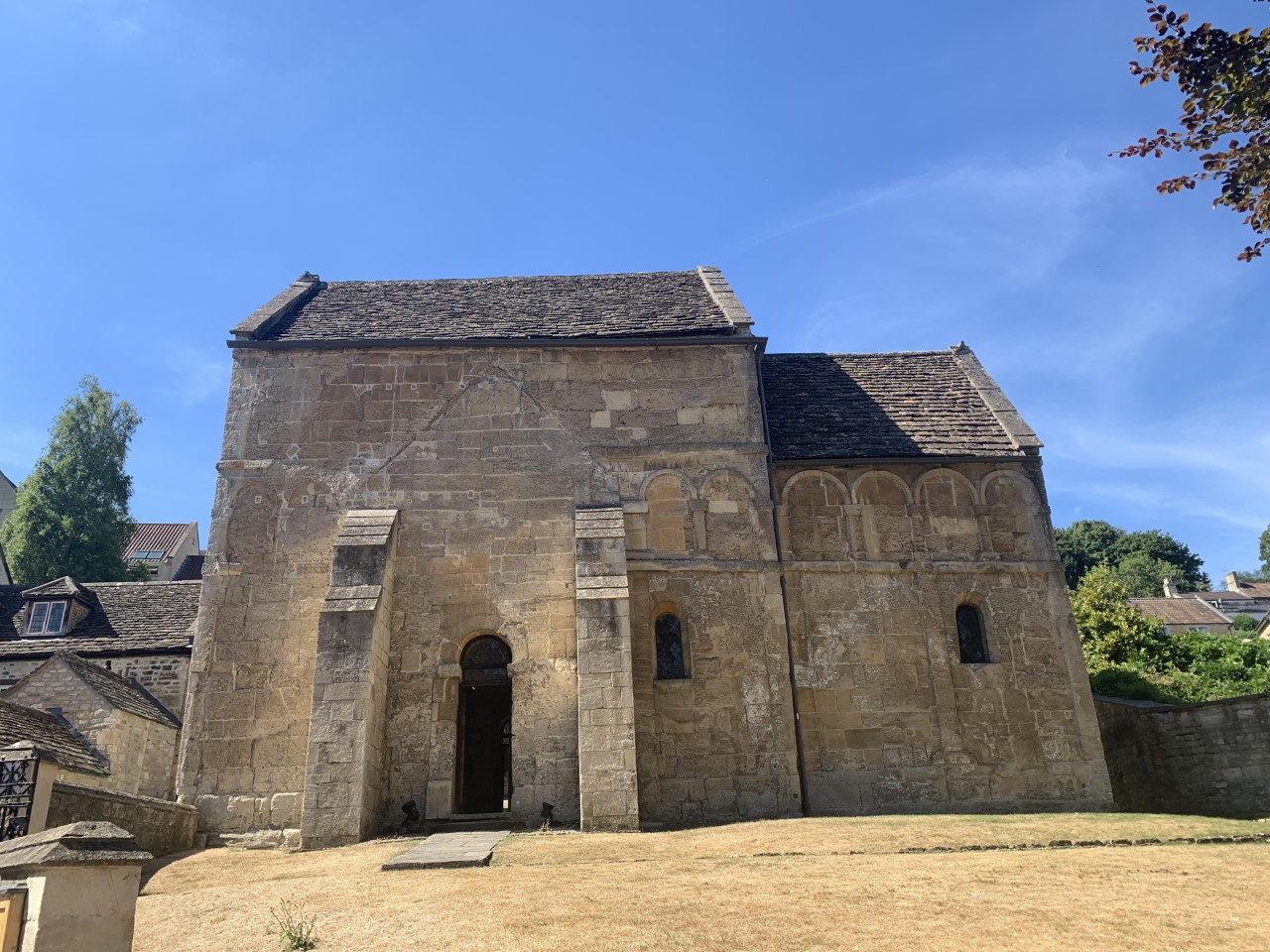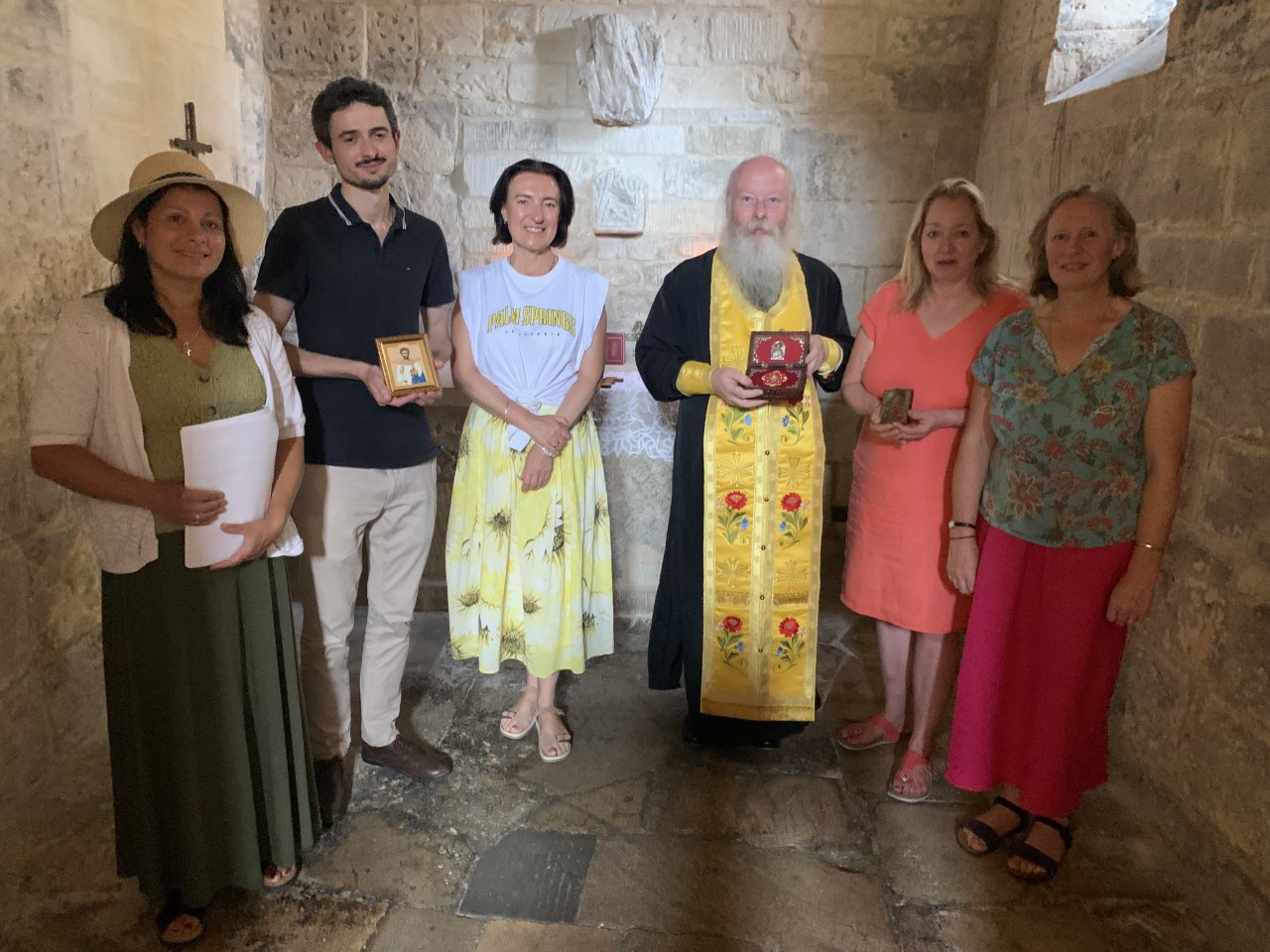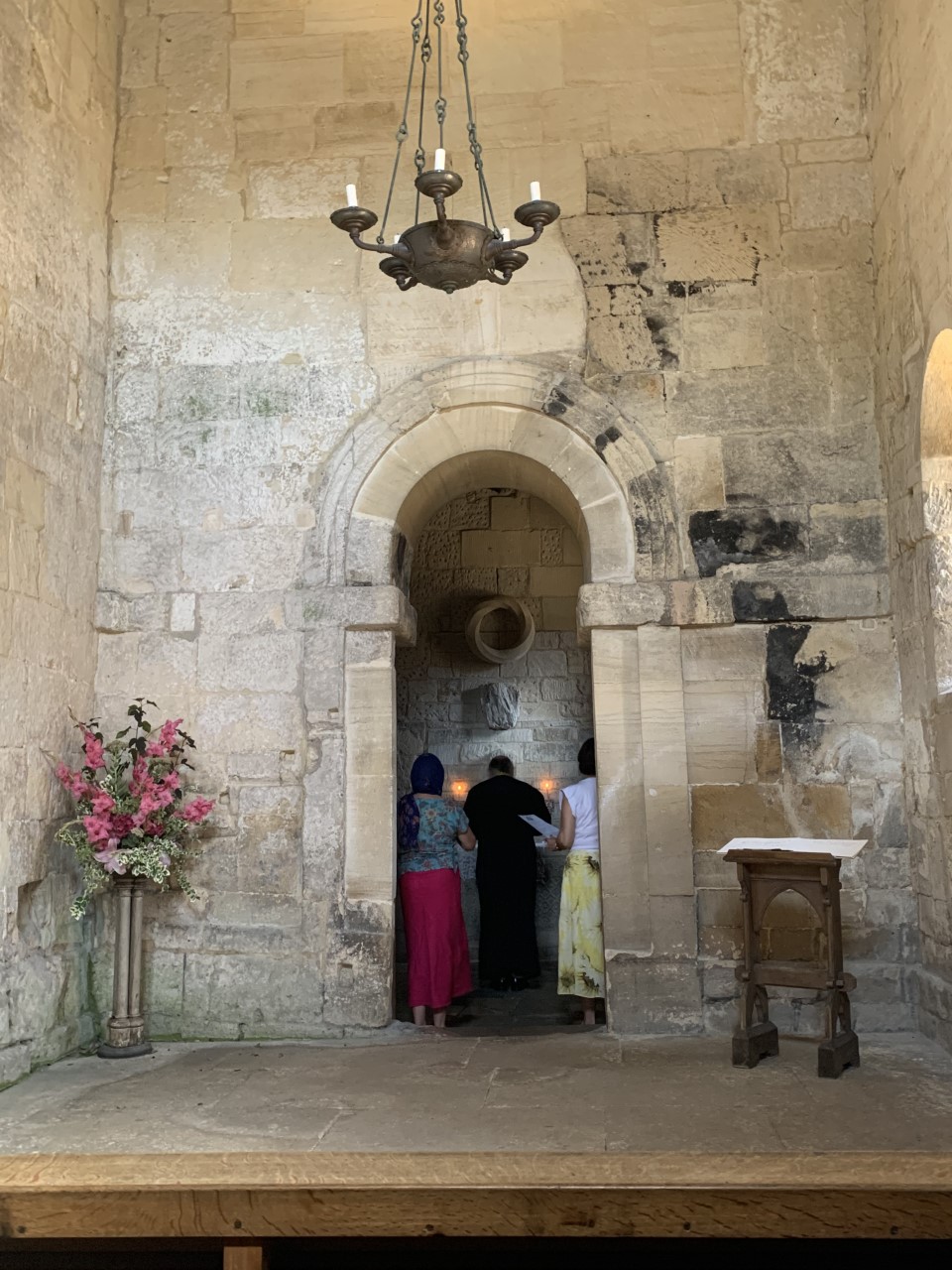Sacrificial living and dying: Baroness Natalia Modestovna von Fredericks (†1926), from Chapter 24 of ‘The Inextinguishable Lamp’, by Boris Shiryayev, New York 1954.
According to the strict rule of the Solovetsk Monastery, women were not allowed on the island. They could venerate the holy objects only from afar, from the tiny “Hare’s Island.” From the wharf it was only a little more than a verst, and its entire kremlin with its soaring cupolas could be seen as if on the palm of a hand.
The tradition was preserved. The island’s new master set Hare’s Island apart as a women’s “special” zone. Its denizens were primarily those who had sinned against the seventh commandment. The only man allowed, who was there in the capacity of a representative of the regime, was a seventy-year-old Jew. God knows how he came to occupy a managerial position in the Cheka. His transgressions, however, eventually exceeded the limit, and he had the good fortune to be exiled. His age and decrepitude placed him, like Caesar’s wife, above suspicion.
Women prisoners who were not guilty of any infractions there on Solovki, lived on the main island, but outside the kremlin, in a compound encompassed by three rows of barbed wire. From there they were taken to work under heavily armed escort to the laundry, the rope-making shop, the peat extraction works, or the brick factory. The laundry and rope-making were considered light work, but the brick factory – the molding and transporting of the raw clay – struck fear. The women stopped at nothing in order to avoid being assigned to the “bricks.” Few lasted more than two or three months at this arduous labor, which was beyond a woman’s physical capacity.
Life in the women’s barracks was more difficult than in the kremlin. Its residents, who were profoundly dissimilar in respect of spiritual make-up, cultural level, habits, and needs, were all mixed and pounded into one mass, without any possibility of separating into individual, homogeneous groups, as happened in the kremlin. The number of criminals far exceeded the number of political prisoners, and the former were united in lording it over the latter. Prostitutes, drug dealers, contrabandists. . ., and among them-aristocrats, officers’ wives, ladies-in-waiting.
Departure from the barracks was strictly controlled. Even to the theater, the women went under escort and sat there in a bloc, also under surveillance.
Women are considerably less adaptable than men to communal life, even under normal circumstances. Life in the women’s barracks was a hell, and thrown into this hell was a woman who had been a lady in waiting for three empresses. She was a sixty-five-year-old baroness whose family name was well known throughout all of Russia.
Dostoevsky spoke a great truth when he said, “Simple people who are sent to hard labor come into their own milieu, a milieu that is perhaps even more developed than their own. An educated person, who is subject to the same punishment, often loses incomparably more than the simple man. He must crush within himself all his needs, all his habits; he must enter a milieu that is for him inadequate; he must learn to breathe another kind of air… And often it happens that the same punishment that is meted out to everyone else is for him ten times more torturous. This is the truth…” (House of the Dead, p 68.)
It was precisely this greatly intensified punishment that this old lady bore, a lady whose only fault lay in being born into an aristocratic rather than a proletarian family.
If for Korablikha, the mistress of a criminals’ haunt in the port city of Kronstadt, the life of the women’s barracks and its atmosphere were the “usual,” what were they for a graduate of the Smolniy Institute, who belonged to the closest circles around the throne? How much harder for her was each year, each day, each hour of captivity?
It was a constant trial that never let up, neither day nor night. The GPU knew this, and sadistically separated the political prisoners among the various cells, so that no two of them were together. They could not do this with the men in the kremlin, but it was possible in the women’s zone. The baroness’s life in Saint Petersburg cultivated very few qualities that could mitigate her lot on Solovki. So it appeared. But it only appeared that way. In fact, the baroness lady-in-waiting carried away from it a genuine feeling for the human dignity and, inextricably bound to this, respect for the individual person; maximum, at times incredible, self-control; and a profound consciousness of personal duty.
When she turned up in the barracks, the baroness was given a worse than hostile reception. It was evoked by envy for her past. Women are unable to suppress this feeling, to curb it, and they give in to it completely. The weak, frail old lady was despised not for herself, for who she really was, but as a bearer of that illusion that fascinated and attracted to itself the dreams and fancies of her haters. Every movement of the elderly lady-in-waiting, every sound of her voice, reflected the past, its elegance, its refinement, its brightness. She could not conceal it, even had she so desired, but she did not desire to do so. She remained an aristocrat in the best and true meaning of the word. In the women’s barracks on Solovki, amid the stench of cursing and foul language, in the chaos of brawls, she was the same as she was observed to be in court. She did not remain aloof, she did not wall herself off from those around her; there was about her not a shadow of that haughtiness that is an invariable mark of false aristocrats. In becoming a prisoner, she acknowledged herself as being such, and accepted her lot as unavoidable, as a cross that she must bear without murmuring, without complaining, without pitying herself, without tears, without looking back.
As soon as she arrived, the baroness was, of course, assigned to “the bricks.” One can only imagine how difficult it was for her, already in the seventh decade of her life, to carry trays loaded with seventy-five pounds of clay. Her comrades at work taunted her gleefully:
“Baroness! Lady-in-Waiting! Hey, you’re no longer hauling around her majesty’s train. Get a taste of our kind of work!” Although few of them had really worked before coming to Solovki.
They did not take their eyes from her and greedily awaited groans, complaints, tears of weakness – but they waited in vain. Self-control and inner discipline, nurtured through the course of her life, saved the baroness from humiliation. Doubtless fatigued, she gave no sign of it, and labored to the end of the day, and in the evening, as always, prayed at length, standing on her knees before a small icon.
My good friend from my time on Solovki, the Kronstadt mistress Korablikha, a real Russian wench, gutsy and sharp-tongued, who nevertheless retained a sense of “compassion” in her heart, related to me later:
“As soon as she stood on her knees, Sonka Glazok began grumbling: ‘Take a load of this. She’s even put up her God. We’ve got a saint here.’ But Annusha retorted, ‘What’s it to you? Has she taken any of your stuff? Look, the lady is taking care of her soul!’ Sonka bit her tongue.”
The same was repeated in the days that followed. The baroness calmly and deliberately carried the raw bricks. Returning to the barracks, she carefully cleaned her dress, ate her bowl of fish slop in silence, prayed, and went to sleep on her neatly made plank bed. She did not join the elite circle of intelligentsia there in the women’s barracks, but neither did she hold herself aloof, just as she did not hold herself aloof from any of her fellow women prisoners. She spoke in the same way to Princess Shakhovskoy, who constantly peppered her speech with French phrases, as she did to Sonka Glazok, whose use of unprintable vulgarities was similarly constant. She spoke only in Russian, although the “elite” preferred French.
As the dismal Solovetsk days passed, the attacks against the baroness grew less and less frequent. It was evident that the “barbs” of the sharp-tongued women failed to reach their mark.
“This morning Manka Dlinnaya jumped on the baroness as she was at the wash sink,” Korablikha related to me that evening at rehearsal. “She swiped her brushes and her soap – You’re hogging the faucet! I gave her a good swat with a dirty rag. Why are you offending a godly old woman? What’s the matter, don’t you have enough water? What’s it to you if she’s trying to keep clean?”
Attitudes towards the former lady-in-waiting changed definitively when the cleaning woman for her barracks “came forward.” To “come forward” in Solovetsk slang meant to report that one was pregnant. It was a general rule that those who transgressed the regulation against sexual relations were sent to isolationist cells on Hare Island, even those who were up to seven or eight months pregnant. However, those who were closer to their due date were sent to Anzersk, where they gave birth and breastfed their infants in relatively tolerable conditions, where they were given just light work. Pregnancy, therefore, was carefully concealed, and was declared only then when one could, by-passing Hare’s Island, be sent directly to “the moms.”
The cleaning woman who had “come forward” had to be replaced. It was an old prison custom that this replacement was democratically chosen. The position required relatively light work: washing the floors, bringing in firewood, tending the stove. The women fought for the position.
“Who are we going to put?” asked Korablikha. She was the cell leader.
“The baroness!” yelled Sonka Glazok, unrestrained both in hate and in love.
“Who besides her? She’s the cleanest of any of us. There won’t be any unpleasantness…”
The argument had weight. For dirt or untidiness, the whole barracks was punished. And so the lady-in-waiting who had served three Russian empresses became the cleaning lady of a cell of thieves and prostitutes. This was a great “mercy” for her. It was obvious that “the bricks” were leading her towards the grave.
I myself never spoke to the baroness, but I attentively followed news of her through my acquaintances who worked in the theater: Korablikha and that same Sonka Glazok, who sang in the chorus.
In occupying a specific social position in the prison collective, the baroness not only ceased to be a foreigner, but she automatically acquired a certain authority, even power, corresponding to her “rank.” It seems that she began to draw near to the rest of the women in her cell when they began consulting her on the intricate mysteries of make-up, a subject that received the same studious attention in prison as it did at the court.
Later the conversations became more profound, more serious… And so… At the theater we were preparing to put on A. Tolstoy’s, The Empress’s Plot, an entertaining pot boiler that was playing at the time in all the theaters of the USSR. Armanov played Rasputin, and eagerly collected any information about him from those who had seen the enigmatic elder.
“That’s a bunch of lies. The empress never had an affair with him,” declared Sonka peremptorily. “She received him only because he prayed hard for the Heir… There weren’t nothing else between them. Our baroness was a witness, and she wouldn’t lie.”
Korablikha, who had received her political credo from among the Kronstadt sailors, illumined the matter from another angle:
“One peasant reached the Tsar and told him the truth. For this the bourgeoisie killed him. The Tsar had promised him that if the Heir should be healed, he would give the land to the peasants. That’s what happened!” The baroness’s growing spiritual influence was felt more and more strongly there in her cell. This great mystery of Man’s awakening took place without any compulsion, without any arguments or debates. She did and said what was necessary, just as she had done throughout her life. The strength of her influence on those around her lay precisely in the simplicity and total lack of moralizing in her words and actions.
Sonka continued to swear a blue streak in the company of men, but among women she became noticeably restrained, and her epithets lost their former insolence, turning into mere words, without which she was not always able to express her tempestuous emotions. On Passion Week, she, Korablikha, and two other women from the chorus prepared for Holy Communion and went to confession to the “comforting priest,” who was smuggled into the theater for that purpose. They partook of the Mysteries in a dark prop room, with Gifts brought in an ordinary soldier’s mug in the side pocket of a sailor’s jacket. Standing guard at the door was the prop-man, a Turk by the name of Reshad-Sedad, in the recent past a communist, a member of the People’s Commissariat and “enlightener” of Adzharistan. If they were found out, they would all be sent to Sekirka or Hare Island – if not worse.
A terrible epidemic of typhus broke out and a call was made for nurses or those who could do their job. The chief of the Sanitary Department, M. V. Feldman, did not want to be assigned to this potentially fatal work. She came to the women’s barracks and, gathering its residents, tried to persuade them to go voluntarily, promising them a wage and good rations. There were no takers. She tried appealing to their conscience, calling them to the aid of the dying. But her effusiveness was no more successful. Just then the elderly cleaning lady entered the cell with a load of firewood. Her head was wrapped in a scarf; outdoors there was a bitter frost. Stacking the wood by the stove, she only heard Feldman’s last words.
“So, no one wants to help the sick and dying?”
“I do,” came a voice from near the stove.
“You? Can you read?”
“I can.”
“And can you read a thermometer?”
“Yes. I worked for three years as a surgical nurse in the imperial infirmary.”
“What’s your name?”
The baroness gave her family name without mentioning her title.
“Baroness!” cried out Sonka, followed by several more women. Among them were none of the “elite,” in spite of their frequent talk of Christianity and of their religiosity.
The doors of the typhus barracks closed after the lady-in-waiting, a lady who had served three empresses. There were few survivors. The majority who entered the barracks did not leave it alive.
M. V. Feldman later related that the baroness was assigned as the head nurse but worked alongside those under her. They were short-handed. The work was hard. The sick lay side by side on the floor, and as the nurses changed the bedding, their hands would be covered by the putrid discharge. It was a frightful place.
The baroness worked day and night. She worked just as quietly and deliberately as she had carried bricks or washed the floor of the women’s barracks. With the same careful and deliberate manner in which she doubtless carried out her duties as a lady-in-waiting. This final act of service was not some impulsive outburst of selflessness but the result of a profound inner culture, not only imbibed together with her mother’s milk, but inherited from preceding generations. The time will come when genetics will reveal the great mystery of hereditary transmission.
Her sense of duty and profound personal discipline gave her the strength to carry on her work to the last hour, the last minute, her last breath… This hour struck when the fatal typhus showed up on the baroness’s hands and neck. M. V. Feldman noticed it.
“Baroness, go and find a bed for yourself in the special ward. Haven’t you noticed it yourself?”
“What for? You well know that at my age no one recovers from typhus. The Lord is calling me to Himself, but I can still serve Him another two or three days.”
They stood facing one another. The aristocrat and the communist. The virgin and the passionate, still unrepentant Magdalene. The believer and the atheist. Women from two different worlds.
The effusive, impulsive Feldman embraced and kissed the old lady. When she told me about this later, her eyes filled with tears.
“You know, I wanted to make the sign of the Cross over her, just as my old nanny used to cross me when I was a child. But I was afraid of offending her religious sensibilities. After all, I’m Jewish.”
The baroness drew her final breath a day later. During the morning rounds, she sat down on the floor, then she lay down. Shortly thereafter she was overtaken by delirium.
Sonka Glazok also never left the barracks of death. Their souls appeared together before the Throne of God.
